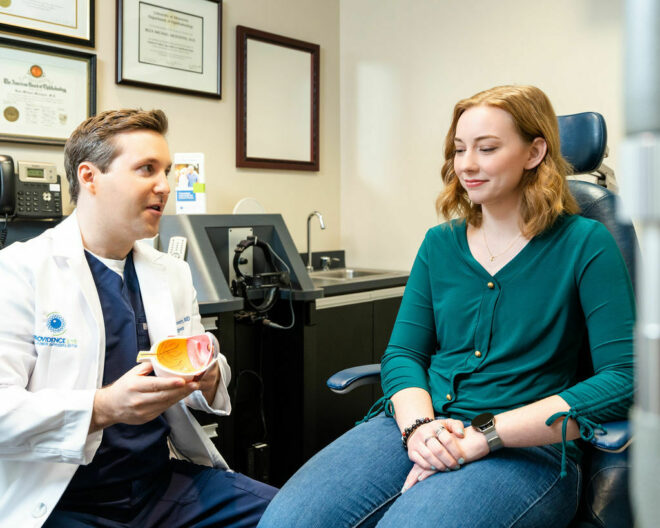
Whether you are on a soccer field watching your child play, attending a cocktail party or relaxing with friends on the beach or in the mountains, oftentimes the topic of LASIK comes up. Most people know at least one person, if not several, who has undergone LASIK or a LASIK alternative, such as EVO ICL or PRK. In some cases, multiple people are in the same family! LASIK was approved by the FDA in 1999, and with decades of history and millions of eyes treated worldwide, it is proven to be a safe and effective option for ideal candidates. The high level of safety and effectiveness of LASIK has made this life-changing procedure extremely popular. Despite this, some people are still hesitant because they are worried that LASIK has long-term side effects. This fear is often due to inaccurate or outdated information.
Before addressing questions about if LASIK has long-term side effects, it's important to first understand what LASIK is. LASIK is a two-step procedure that corrects vision by reshaping the cornea, the clear front window of the eye. This allows light to pass through properly and provides clear vision without the need for glasses and/or contacts. Since 2003, Providence Eye & Laser Specialists has been performing all-laser LASIK, and we have never used a blade. Over the years, we have retired our original lasers and adapted to advancements in technology, which has significantly improved the comfort of the procedure and outcomes and has reduced the likelihood of long-term side effects. Today, our surgeon Dr. Nunnery uses the WaveLight FS200 and its ‘sister’ laser, the Wavelight EX500.
During a consultation for vision correction surgery, whether it be LASIK or an alternative to LASIK, your surgeon should have a conversation with you regarding the common short-term and rare long-term side effects. If this conversation does not occur, you should consider doing more research and consulting with different surgeons to find a more straightforward approach.
After any ocular procedure, your eyes need to recover. Although you may feel good, your eyes will go through a recovery period. After LASIK, it is normal and expected to experience one or more of the following common short-term side effects:
Long-term side effects of vision correction surgeries are extremely rare. The best way to reduce the risk of any short-term or long-term side effects is to make informed decisions and take appropriate steps before and after the procedure. Here are some important considerations to keep in mind when selecting a surgeon and preparing for the procedure.
Finally, it’s important to feel comfortable with and trust your surgeon and the medical practice; you will carry their work around with you for the rest of your life. Make sure to verify that your surgeon and facility will be available for you in the future if necessary. That is when it counts. If you have an unexpected issue, you need your surgeon the most at that point.
Although it is easy to comb the internet and find extreme cases, you have no idea the context behind the situation. Were they an ideal candidate? Was their surgeon experienced and attentive to every detail? Was it all-laser LASIK? Was the technology up-to-date? Did they follow pre-and post-operative instructions? With a 35-year history, it has been demonstrated that only in extremely rare cases does LASIK have lasting side effects — less than 1%. However, with the use of contact lenses, 1 out of every 500 users runs the risk of serious eye infections that can lead to blindness.
If you’re ready to see clearly and live better without contacts or glasses, LASIK may be a great option for you. However, it's not a decision to take lightly. Do your research, be cautious of low-cost LASIK options, choose your surgeon and facility carefully and always follow instructions to minimize any long-term side effects.
Schedule a complimentary LASIK consultation at Providence Eye today! Our vision correction surgeon, Dr. Nunnery, is a cornea specialist and uniquely trained to determine if LASIK is safe for you.